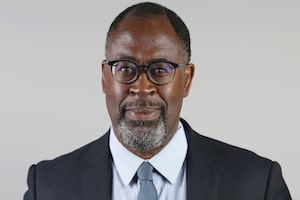
A woman cleans the stage at Erin O'Toole's election night headquarters during the Canadian federal election in Oshawa, Ont., on Sept. 20, 2021.Adrian Wyld/The Canadian Press
The federal Conservative Party says its membership has reached 678,708, a record for a Canadian political party that has caught the attention of its rivals.
The figure announced Friday is the final verified number in the race for the party leadership, and is about 3,000 higher than a preliminary figure announced a month ago.
In a statement, the party said that the most significant growth, by percentage, is in Quebec, Newfoundland and Labrador, British Columbia and New Brunswick. Party membership in Quebec, for example, has increased to 58,437 from 7,648 at the end of 2021.
And in vote-rich Ontario, the numbers have increased to 295,815 from 77,264 at the end of last year.
The leadership campaigns were signing up members, until a June 3 cut-off date, that they hoped would support them in voting ahead of the Sept. 6 deadline for the party receiving ballots. A winner will be announced on Sept. 10 in Ottawa.
The party said that, to date, it has received 80,000 ballots for registration and verification by the professional-services company Deloitte.
NDP national director Anne McGrath said it’s not unusual for memberships in any party to increase during a leadership race. “But those numbers are pretty incredible, above and beyond what you would expect in other leadership races,” she said in an interview. “You can’t diminish the significance of numbers like that.”
Ms. McGrath said the question is whether the new members will remain members in a year, and whether they will vote in the next election. Asked about the current number of NDP members, she said she did not have a figure to provide but that the NDP has a committed membership base.
There are five candidates vying for the Conservative leadership: Ontario MPs Scott Aitchison, Leslyn Lewis, and Pierre Poilievre; former Quebec premier Jean Charest; and Roman Baber, a former Progressive Conservative member of the Ontario Legislature.
Mr. Poilievre’s campaign has said that it has signed up about 311,000 members, with the campaign of disqualified candidate Patrick Brown saying it brought in about 150,000 members.
Opinion: Pierre Poilievre is the latest iteration in the long history of ‘Made in Canada’ populism
In total, said the party statement, 2.5 per cent of eligible voters in Canada are now Conservative Party members.
Mr. Baber said many of the members will door knock, install lawn signs and donate during the next election. “This is a remarkably large base of supporters to take on Justin Trudeau,” he said in a statement. Mr. Aitchison’s campaign director, Jamie Ellerton, said in a statement that his team would forge on, seeking support.
Mr. Charest’s campaign director, Michelle Coates Mather, said his campaign would seek the support of the 80 per cent of Conservatives who have not yet voted, and that Mr. Charest has considerable support in such locations as Quebec and Newfoundland and Labrador, where membership has surged.
She also said that a party debate next week will provide an opportunity for Mr. Charest to tout his credentials. Mr. Poilievre and Ms. Lewis have declined to participate.
Neither campaign responded to requests for comment from The Globe and Mail concerning the party membership totals.
Federal Liberal communications co-ordinator Dmytro Basmat said the party had 294,002 members and supporters registered ahead of the 2013 Liberal leadership race, and now has a sustained roster of about 200,000 registered Liberals.
He noted in a statement that when the Conservatives choose their new leader in September, it will be their fourth since Justin Trudeau became Liberal Leader in 2013.
As the Conservative leadership race unofficially began in February, with the caucus voting out Erin O’Toole as leader, the party said it had about 160,000 members.
The 678,708 figure compares with more than 269,000 people registered for the 2020 Conservative leadership race – a record for the party at that time. The party’s membership high was about 282,000 after the Canadian Alliance and the Progressive Conservatives merged in 2003.
Conservative commentator Tim Powers, chair of Summa Strategies and managing director of Abacus Data, said in an interview that the numbers suggest an audience interested in change from the current Liberal government and is a wake-up call for the other parties.
“Certainly, if they didn’t know it before, they need to know there is unrest in the land and people are giving the Conservatives a look, at least right now,” Mr. Powers said.
For subscribers only: Get exclusive political news and analysis by signing up for the Politics Briefing
 Ian Bailey
Ian Bailey